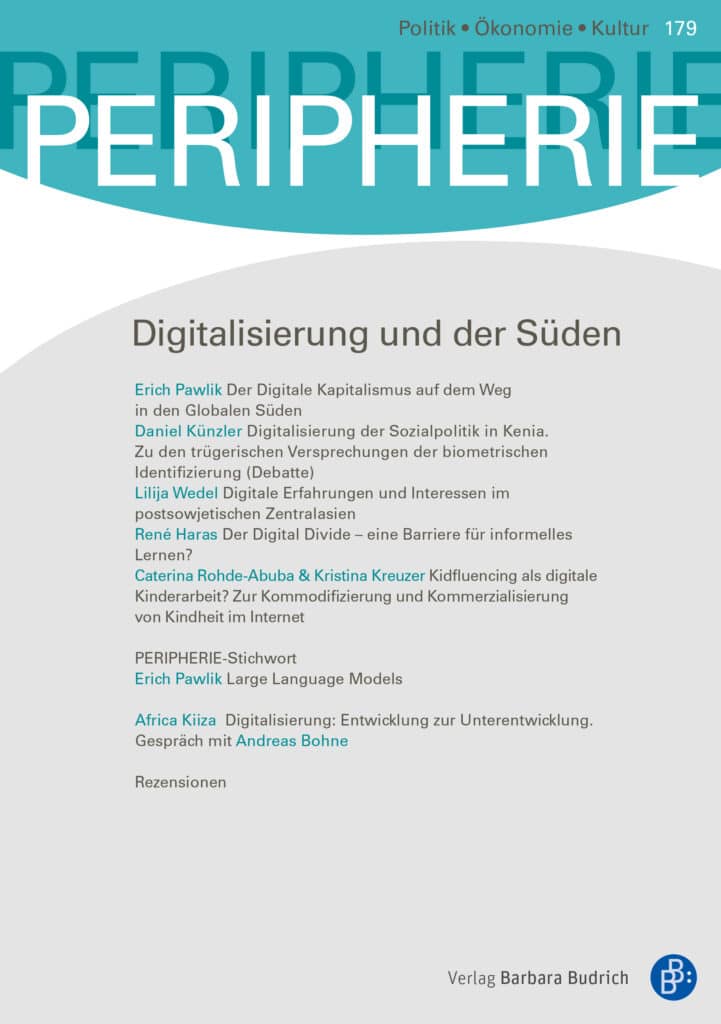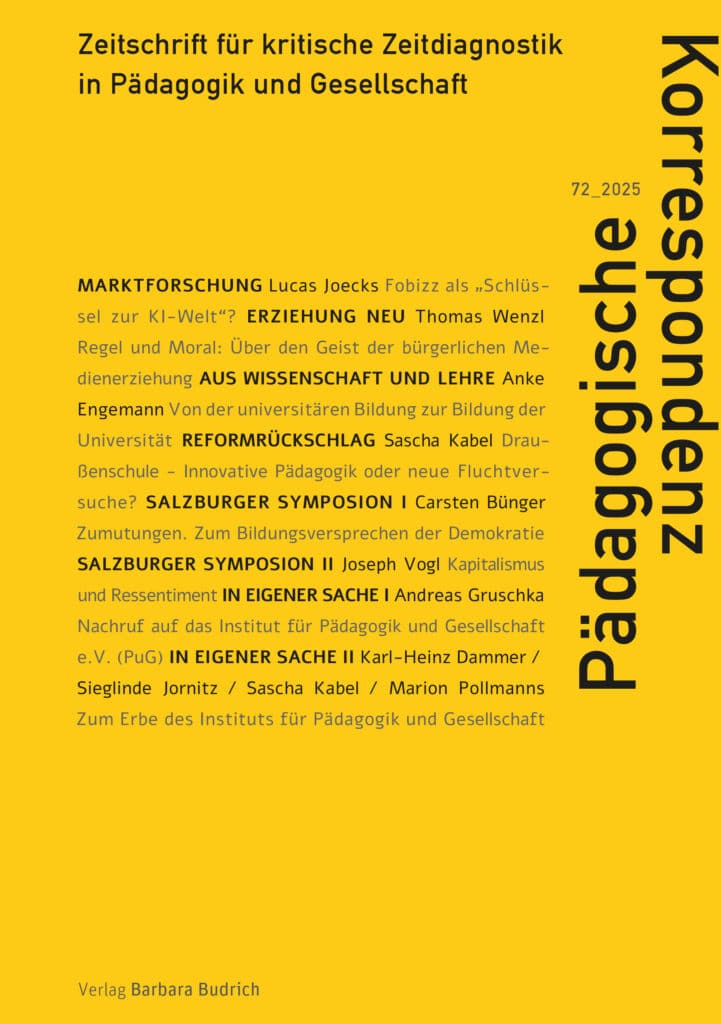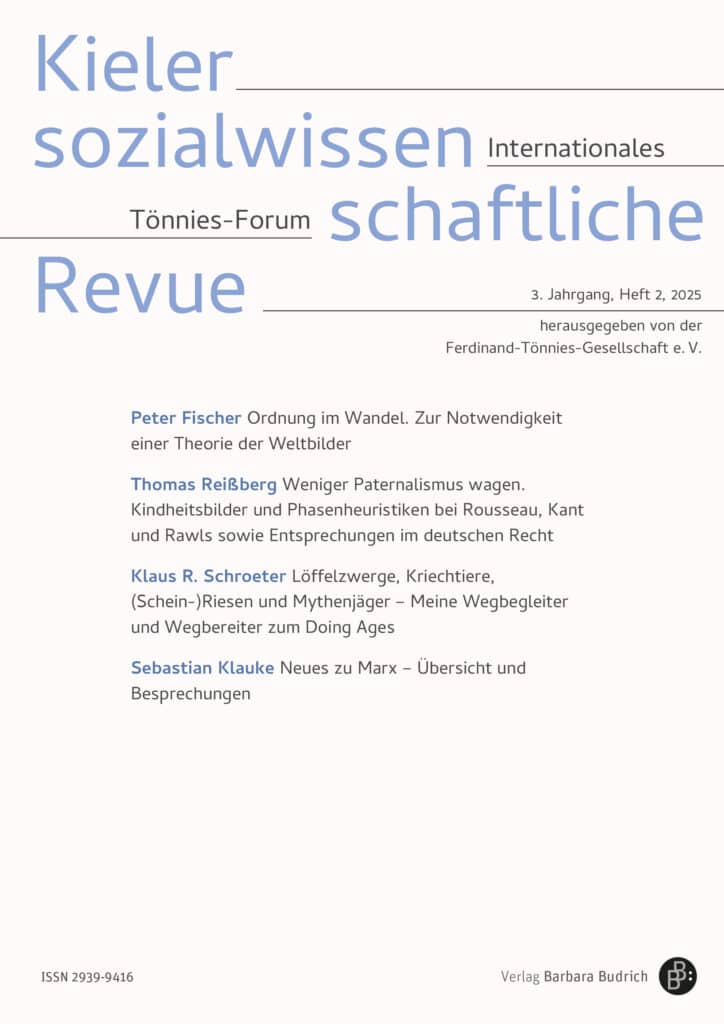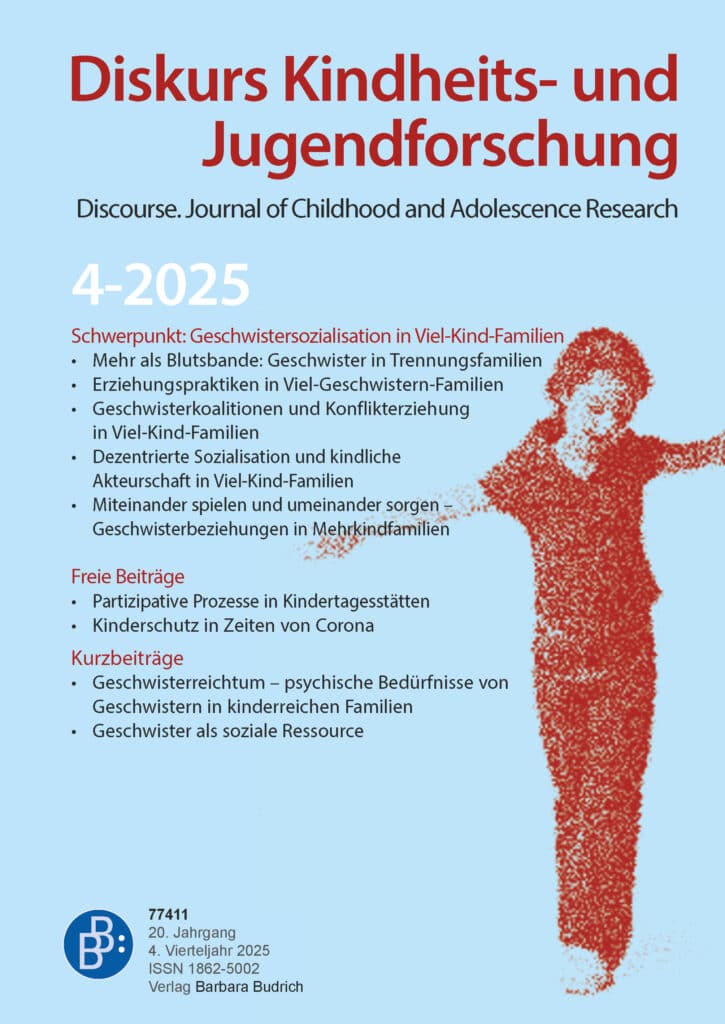Informationen zur Zeitschrift
Home » Publications » dms 1-2021 | Digital transformation in the public sector: from design to impact
dms 1-2021 | Digital transformation in the public sector: from design to impact
Erscheinungsdatum : 15.06.2021
0,00 € - 75,00 €
Inhalt
dms – der moderne staat – Zeitschrift für Public Policy, Recht und Management
1-2021: Digital transformation in the public sector: from design to impact
hrsg. von Caroline Fischer, Moritz Heuberger & Moreen Heine
Themenschwerpunkt
Caroline Fischer / Moritz Heuberger / Moreen Heine: The impact of digitalization in the public sector: A systematic literature review
Birgit Jæger: Digital Citizenship – A review of the academic literature
Julia Schwanholz / Lavinia Zinser / Johannes Hindemith: Measuring policy effects: online participation on the municipal level
Florian Lemke / Konstantin Ehrhardt / Olha Popelyshyn: Support and resistance of public officials towards current eGovernment initiatives – A case study on Ukraine and Germany
Lucille Tetley-Brown / Ewan Klein: Exploring data-in-use: the value of data for Local Government
Maike Rackwitz / Thurid Hustedt / Gerhard Hammerschmid: Digital transformation: from hierarchy to network-based collaboration? The case of the German ‘Online Access Act’
Stijn Wouters / Veiko Lember / Joep Crompvoets: Coordinating the digital transformation of inter-organizational public services – The case of e-invoicing in Belgium
Abhandlungen
Christine Prokop: Die individuelle Meinung öffentlich Beschäftigter zu Public Policies. Eine empirische Untersuchung am Beispiel einer Anti-Diskriminierungsmaßnahme
Michael Vollstädt: Public Entrepreneurship. Zur Unternehmerisierung der öffentlichen Verwaltung
Nadin Fromm / Christian Schreiner: Die Sozialwahlen in der Krise: E-Democracy als Chance?
Essay
Ivo Bischoff / Eva Bode: Der Nexus zwischen Digitalisierung und der Frage nach der optimalen Kommunalstruktur
Rezensionen
Hellmut Wollmann: The Institutionalisation of Evaluation in Europe (Reinhard Stockmann, Wolfgang Meyer, Lena Taube (Eds.))
Werner Jann: Culture and Values at the Heart of Policy Making – An Insider’s Guide (Stephen Muers)
Jan-Hinrik Meyer-Sahling: Handbook of Corruption, Ethics and Integrity in Public Administration (Adam Graycar (Ed.))
Joshua Elsässer: Managing Money and Discord in the UN: Budgeting and Bureaucracy (Ronny Patz, Klaus H. Goetz)
Inhaltsverzeichnis herunterladen
Einzelbeitrag-Download (Open Access/Gebühr): dms.budrich-journals.de
Sie können sich hier für den dms-Alert anmelden.
Zusätzliche Informationen
| Publisher | |
|---|---|
| ISSN | 1865-7192 |
| eISSN | 2196-1395 |
| Volume | 14. Jahrgang 2021 |
| Edition | 1 |
| Date of publication | 15.06.2021 |
| Scope | 244 |
| Language | Deutsch |
| Format | 17 x 24 cm |
| DOI | |
| Open Access-Lizenz | |
| Homepage |
Autor*innen
Keywordsacademic landscape, anonymisierte Bewerbung, Anti-Diskriminierungsmaßnahmen, change-management, citizen participation, coordination instruments, data ecosystem, data use, digital citizenship, digital transformation, Digitalisation, Digitalisierung, digitization, E-Democracy, entrepreneurship, Germany, impact evaluation, institutional design, inter-organizational coordination, intergovernmental collaboration, interkommunale Zusammenarbeit, Kommunalstruktur, Kostenstruktur, leadership, liquid democracy, LiquidFeedback, New Public Management, Online Access Act, Partizipation, policy implementation, public sector digitisation, public services, public value, public values, Regionalreform, Scotland, soziale Selbstverwaltung, Sozialversicherungswahlen, streams of literature, Ukraine, Umfrage, Ökonomisierung, öffentliche Verwaltung, öffentlicher Dienst
Abstracts
The impact of digitalization in the public sector: A systematic literature review (Caroline Fischer, Moritz Heuberger, Moreen Heine)
The digitalization of public administration is increasingly moving forward. This systematic literature review analyzes empirical studies that explore the impacts of digitalization projects (n=93) in the public sector. Bibliometrically, only a few authors have published several times on this topic so far. Most studies focusing on impact come from the US or China, and are related to Computer Science. In terms of content, the majority of examined articles studies services to citizens, and therefore consider them when measuring impact. A classification of the investigated effects by dimensions of public value shows that the analysis of utilitarian-instrumental values, such as efficiency or performance, is prevalent. More interdisciplinary cooperation is needed to research the impact of digitalization in the public sector. The different dimensions of impact should be linked more closely. In addition, research should focus more on the effects of digitalization within administration. Keywords: digital transformation, e-government, impact evaluation, public value, public values
» Einzelbeitrag kostenlos herunterladen (Budrich Journals)
Digital Citizenship – A review of the academic literature (Birgit Jæger)
When digital technologies become a part of everyday life in most parts of society, it changes the way we work, organize, communicate, and make relations. It also changes the relationship between the state and its citizens – a relationship usually conceptualized as citizenship. To capture this transformation, a new concept of digital citizenship has emerged. The overall purpose of this paper is to overcome the fragmentation of knowledge about how citizenship is transformed into digital citizenship through a systematic review of the academic literature on the concept of digital citizenship. The literature review identifies four streams of literature in the academic landscape of digital citizenship, and by a content analysis, it outlines the many dimensions and facets of digital citizenship. In this way, the literature review offers a comprehensive picture of both the impacts of the digital transformation on citizenship and the concept within the academic debate. Key Words: Digital Citizenship; Impacts of Digital Transformation; Academic Landscape; Streams of Literature
» Einzelbeitrag kostenlos herunterladen (Budrich Journals)
Measuring policy effects: online participation on the municipal level (Julia Schwanholz, Lavinia Zinser, Johannes Hindemith)
Do citizens‘ decisions, which are discussed and co-ordinated a priori on online participation platforms, have any policy effects? The article addresses this question in an exploratory study. Taking theoretical concepts of participation and policy effects into account, LiquidFeedback platforms are investigated in four municipalities in Lower Saxony (Germany). A total of 80 cases—i.e., successful citizens’ initiatives that were afterwards considered by local city or district councils—are included in a content analysis. Results show that crucial policies are less often translated into binding policy decisions than other policies. Even though citizens’ decisions can have binding policy effects, large-scale projects, in particular, show rather diffuse policy effects. However, diffuse policy effects are hardly transparent for citizens and could, accordingly, inhibit the willingness to participate altogether. Keywords: Citizen participation, digitization, liquid democracy, LiquidFeedback, local government
» Einzelbeitrag kostenlos herunterladen (Budrich Journals)
Support and resistance of public officials towards current eGovernment initiatives – A case study on Ukraine and Germany (Florian Lemke, Konstantin Ehrhardt, Olha Popelyshyn)
This article provides insights on how German and Ukrainian public sector employees perceive and position themselves towards current eGovernment initiatives. After presenting the academic literature on the roles of individual public servants in transformative change processes in public administration, the eGovernment approaches followed by Germany and Ukraine are explained. The results of a survey (n = 74) conducted among public servants in both countries provide information on their perceived contribution to and participation in the digitisation of government service delivery, as well as reasons and causes for motivation or frustration in this context. By analysing the survey responses and identifying potential impediments of successful eGovernment implementation, the authors provide recommendations for action for executives that drive digital transformation, such as organising tool-specific training and Single Points of Contact for employees after introducing new processes and software, adjusting educational programmes for new public servants, and establishing a feedback and knowledge-sharing culture when creating new e-services. Keywords: eGovernment, Motivation, Ukraine, Germany, Public Sector Digitisation
» Einzelbeitrag kostenlos herunterladen (Budrich Journals)
Exploring data-in-use: the value of data for Local Government (Lucille Tetley-Brown, Ewan Klein)
The power of data to support digital transformation within the context of e-Government is frequently underestimated. In this exploratory research, we develop a conceptual framework where the value of data stems from how it is used. We claim that the impact of digital transformation in the public sector presupposes an organisational culture that recognises and values data-in-use, by which is meant the practical application of data for a specific purpose, particularly by staff who deliver services. Through the lens of two ‘worldviews’ of data sharing, we present case studies of data use in two local authorities in Scotland. We claim that developing a culture where data is leveraged to derive insights for organisational activity requires combining working practices and technical infrastructure that centre on co-creating value with data. The presence of data intermediaries can support effective data-in-use to establish a healthy internal data ecosystem. Our research illustrates that local authorities within Scotland are still at an early stage of developing this culture. Keywords: data ecosystem, digital transformation, local government, data use, Scotland
» Einzelbeitrag kostenlos herunterladen (Budrich Journals)
Digital transformation: from hierarchy to network-based collaboration? The case of the German “Online Access Act” (Maike Rackwitz, Thurid Hustedt, Gerhard Hammerschmid)
To unlock the full potential of ICT-related public sector innovation and digital transformation, governments must embrace collaborative working structures and leadership, is commonly argued. However, little is known about the dynamics of such collaborations in contexts of hierarchy, silo cultures, and procedural accountability. A widely voiced but empirically insufficiently substantiated claim is that bringing cross-cutting digital endeavours forward requires more lateral, network-based approaches to governance beyond traditional Weberian ideals. We test this claim by shedding light on three distinct challenges (complexity, risk, and power imbalance) encountered when implementing the specific collaborative case of the German Online Access Act (OAA) and by examining how they have been addressed in institutional design and leadership. Our analysis, which combines desk research and semi-structured expert interviews, reveals that flexible, horizontal approaches are on the rise. Taking a closer look, however, vertical coordination continues to serve as complementary means to problem-solving capability. Keywords: Digitalisation, intergovernmental collaboration, Online Access Act, leadership, institutional design
» Einzelbeitrag kostenlos herunterladen (Budrich Journals)
Coordinating the digital transformation of inter-organizational public services – The case of e-invoicing in Belgium (Stijn Wouters, Veiko Lember, Joep Crompvoets)
Digital transformation has the potential to profoundly change the way public administrations deliver public services to its users. One of the challenges involved in the inter-organizational networks that often govern integrated digital services is to identify what coordination instruments are effective. In this paper we examine this issue through a case study that deals with the transformation of invoicing services in Belgian public administrations at the federal and Flemish (regional) level. We review the coordination instruments and study how they evolved over time. Our findings suggest that transformation (1) might in part depend on the choice of instruments and multiple mechanisms. The mix of appropriate coordination instruments is likely to change as digital transformation objectives and governance challenges evolve over time. (2) Digital transformation might be a step-by-step process involving multiple rounds of digitalization and its specific implementation contingent on the service itself. Keywords: Public services, digital transformation, e-government, inter-organizational coordination, coordination instruments
» Einzelbeitrag kostenlos herunterladen (Budrich Journals)
Die individuelle Meinung öffentlich Beschäftigter zu Public Policies. Eine empirische Untersuchung am Beispiel einer Anti-Diskriminierungsmaßnahme (Christine Prokop)
In Zeiten erstarkender rechter politischer Parteien kommt der Neutralität der öffentlichen Verwaltung eine besondere Bedeutung zu. Haben öffentlich Beschäftigte eine ablehnende Haltung gegenüber Policy-Zielen oder einzelnen Maßnahmen, kann das den Policy-Implementationsprozess verlangsamen oder verhindern. Insbesondere im öffentlichen Dienst sollte jedoch das Neutralitätsgebot auch gegenüber politisch umstrittenen Policy-Maßnahmen, wie Anti-Diskriminierungs- und gleichstellungsmaßnahmen (ADG), gelten. In dieser Arbeit wird erstmals der Zusammenhang zwischen der Einstellung zu einer ADG-Maßnahme, der individuellen politischen Einstellung und einer Tätigkeit im öffentlichen Dienst empirisch analytisch untersucht. Dazu werden die Ergebnisse einer Umfrage unter insgesamt 1.239 öffentlich und privat Beschäftigten analysiert. Die Ergebnisse der multiplen Regressionsanalyse zeigen, dass Personen die anonymisierte Bewerbung umso stärker ablehnen, je stärker sie sich mit der politischen Rechten identifizieren. Eine Beschäftigung im öffentlichen Dienst hat entgegen der theoretischen Erwartung keinen neutralisierenden Einfluss. Schlagworte: Policy Implementation, Anti-Diskriminierungsmaßnahmen, Anonymisierte Bewerbung, Umfrage, öffentlicher Dienst
» Einzelbeitrag kostenlos herunterladen (Budrich Journals)
Public Entrepreneurship. Zur Unternehmerisierung der öffentlichen Verwaltung (Michael Vollstädt)
Die Entwicklung der öffentlichen Verwaltung in Richtung eines effizienten und effektiv geführten Unternehmens ist seit dem Aufkommen des New Public Management (NPM) ein zentrales Thema von Verwaltungsreformen. Nicht selten tritt die damit eihergehende Ökonomisierung der Verwaltung dabei in Konflikt mit den bürokratischen Strukturen und dem Amtsethos der Angestellten. Bei aller Kritik und Diskussion um diese Tendenz zur Unternehmerisierung bleibt jedoch die Frage, was unter dieser Unternehmerisierung zu verstehen sei, meist latent. Das Ziel dieses Beitrages besteht darin, genauer zu eruieren, welche Vorstellung von Unternehmerisierung in den Diskursen des NPM im Zentrum steht, und ein alternatives Verständnis für die öffentliche Verwaltung zu entwickeln. Dafür bedient sich der hiesige Beitrag Ansätzen der Entrepreneurship-Forschung, um eine inhaltliche Anreicherung der Diskussion zu befördern. Damit soll ein Wandel von einer manageriellen hin zu einer unternehmerischen Sicht der Verwaltung skizziert werden, der anschlussfähig ist für die aktuellen Diskussionen um eine innovative und agile Verwaltung. Schlagworte: Ökonomisierung; Öffentliche Verwaltung; Entrepreneurship; New Public Management; Change-Management
» Einzelbeitrag kostenlos herunterladen (Budrich Journals)
Die Sozialwahlen in der Krise: E-Democracy als Chance? (Nadin Fromm, Christian Schreiner)
Alle sechs Jahre werden in Deutschland per Briefwahl Vertreter gewählt, die sich in Gremien der gesetzlichen Krankenkassen und der Rentenversicherung für die Interessen der Sozialversicherten einsetzen. Dieses Prinzip der Selbstverwaltung des deutschen Sozialversicherungssystems besteht seit dem 19. Jahrhundert. Doch die Sozialversicherungswahlen befinden sich seit längerem in der Krise: Sie verfügen über eine geringe Bekanntheit und eine niedrige Wahlbeteiligung bei proportional großem Aufwand und hohen Kosten. Der vorliegende Artikel analysiert, inwieweit Elemente von E Democracy geeignet sind, das traditionsreiche Instrument zu stärken, um so die Bekanntheit der Sozialversicherungswahlen zu steigern. Anhand der vier Stufen von Partizipation (Information, Konsultation, Kooperation, Mitentscheidung) wird auf Basis empirischer Daten diskutiert, ob E-Voting die Möglichkeiten zur Mitbestimmung erweitert. Schlagwörter: Sozialversicherungswahlen, soziale Selbstverwaltung, Partizipation, E-Democracy
» Einzelbeitrag kostenlos herunterladen (Budrich Journals)
Der Nexus zwischen Digitalisierung und der Frage nach der optimalen Kommunalstruktur (Ivo Bischoff, Eva Bode)
Der vorliegende Aufsatz soll einen konzeptionellen Beitrag zu der Diskussion um eine zukunftssichere Kommunalstruktur und die Rolle von Gebietsreformen leisten. Wir vertreten die These, dass die konventionelle Diskussion zur Gestaltung einer zukunftssicheren Kommunalstruktur in Zeiten der Verwaltungsdigitalisierung grundlegend neu gedacht werden muss. Zum einen eröffnet die Digitalisierung völlig neue Potentiale für die interkommunale Zusammenarbeit. Durch die Kombination Digitalisierung plus interkommunale Zusammenarbeit entsteht einen Alternative zu den zuvor vielfach als alternativlos angesehenen Gebietsreformen. Zum anderen entwertet die Digitalisierung die bisherige empirische Evidenz zu der Frage, welche Größe eine zukunftssichere Kommune mindestens haben sollte. Deshalb empfehlen wir, derzeit von Gebietsreformen abzusehen. Zugleich empfehlen wir, im Zuge der digitalen Transformation der Verwaltung die digitalisierungsbedingten Potentiale der interkommunalen Zusammenarbeit systematisch mitzudenken und gezielt zu nutzen. Schlagworte: Kommunalstruktur, Regionalreform, Digitalisierung, Kostenstruktur, Interkommunale Zusammenarbeit
» Einzelbeitrag kostenlos herunterladen (Budrich Journals)
Inhalt
Inhalt
dms – der moderne staat – Zeitschrift für Public Policy, Recht und Management
1-2021: Digital transformation in the public sector: from design to impact
hrsg. von Caroline Fischer, Moritz Heuberger & Moreen Heine
Themenschwerpunkt
Caroline Fischer / Moritz Heuberger / Moreen Heine: The impact of digitalization in the public sector: A systematic literature review
Birgit Jæger: Digital Citizenship – A review of the academic literature
Julia Schwanholz / Lavinia Zinser / Johannes Hindemith: Measuring policy effects: online participation on the municipal level
Florian Lemke / Konstantin Ehrhardt / Olha Popelyshyn: Support and resistance of public officials towards current eGovernment initiatives – A case study on Ukraine and Germany
Lucille Tetley-Brown / Ewan Klein: Exploring data-in-use: the value of data for Local Government
Maike Rackwitz / Thurid Hustedt / Gerhard Hammerschmid: Digital transformation: from hierarchy to network-based collaboration? The case of the German ‘Online Access Act’
Stijn Wouters / Veiko Lember / Joep Crompvoets: Coordinating the digital transformation of inter-organizational public services – The case of e-invoicing in Belgium
Abhandlungen
Christine Prokop: Die individuelle Meinung öffentlich Beschäftigter zu Public Policies. Eine empirische Untersuchung am Beispiel einer Anti-Diskriminierungsmaßnahme
Michael Vollstädt: Public Entrepreneurship. Zur Unternehmerisierung der öffentlichen Verwaltung
Nadin Fromm / Christian Schreiner: Die Sozialwahlen in der Krise: E-Democracy als Chance?
Essay
Ivo Bischoff / Eva Bode: Der Nexus zwischen Digitalisierung und der Frage nach der optimalen Kommunalstruktur
Rezensionen
Hellmut Wollmann: The Institutionalisation of Evaluation in Europe (Reinhard Stockmann, Wolfgang Meyer, Lena Taube (Eds.))
Werner Jann: Culture and Values at the Heart of Policy Making – An Insider’s Guide (Stephen Muers)
Jan-Hinrik Meyer-Sahling: Handbook of Corruption, Ethics and Integrity in Public Administration (Adam Graycar (Ed.))
Joshua Elsässer: Managing Money and Discord in the UN: Budgeting and Bureaucracy (Ronny Patz, Klaus H. Goetz)
Inhaltsverzeichnis herunterladen
Einzelbeitrag-Download (Open Access/Gebühr): dms.budrich-journals.de
Sie können sich hier für den dms-Alert anmelden.
Bibliography
Zusätzliche Informationen
| Publisher | |
|---|---|
| ISSN | 1865-7192 |
| eISSN | 2196-1395 |
| Volume | 14. Jahrgang 2021 |
| Edition | 1 |
| Date of publication | 15.06.2021 |
| Scope | 244 |
| Language | Deutsch |
| Format | 17 x 24 cm |
| DOI | |
| Open Access-Lizenz | |
| Homepage |
Produktsicherheit
Bewertungen (0)
Bewertungen
Es gibt noch keine Bewertungen.
Authors
Autor*innen
Tags
Keywordsacademic landscape, anonymisierte Bewerbung, Anti-Diskriminierungsmaßnahmen, change-management, citizen participation, coordination instruments, data ecosystem, data use, digital citizenship, digital transformation, Digitalisation, Digitalisierung, digitization, E-Democracy, entrepreneurship, Germany, impact evaluation, institutional design, inter-organizational coordination, intergovernmental collaboration, interkommunale Zusammenarbeit, Kommunalstruktur, Kostenstruktur, leadership, liquid democracy, LiquidFeedback, New Public Management, Online Access Act, Partizipation, policy implementation, public sector digitisation, public services, public value, public values, Regionalreform, Scotland, soziale Selbstverwaltung, Sozialversicherungswahlen, streams of literature, Ukraine, Umfrage, Ökonomisierung, öffentliche Verwaltung, öffentlicher Dienst
Abstracts
Abstracts
The impact of digitalization in the public sector: A systematic literature review (Caroline Fischer, Moritz Heuberger, Moreen Heine)
The digitalization of public administration is increasingly moving forward. This systematic literature review analyzes empirical studies that explore the impacts of digitalization projects (n=93) in the public sector. Bibliometrically, only a few authors have published several times on this topic so far. Most studies focusing on impact come from the US or China, and are related to Computer Science. In terms of content, the majority of examined articles studies services to citizens, and therefore consider them when measuring impact. A classification of the investigated effects by dimensions of public value shows that the analysis of utilitarian-instrumental values, such as efficiency or performance, is prevalent. More interdisciplinary cooperation is needed to research the impact of digitalization in the public sector. The different dimensions of impact should be linked more closely. In addition, research should focus more on the effects of digitalization within administration. Keywords: digital transformation, e-government, impact evaluation, public value, public values
» Einzelbeitrag kostenlos herunterladen (Budrich Journals)
Digital Citizenship – A review of the academic literature (Birgit Jæger)
When digital technologies become a part of everyday life in most parts of society, it changes the way we work, organize, communicate, and make relations. It also changes the relationship between the state and its citizens – a relationship usually conceptualized as citizenship. To capture this transformation, a new concept of digital citizenship has emerged. The overall purpose of this paper is to overcome the fragmentation of knowledge about how citizenship is transformed into digital citizenship through a systematic review of the academic literature on the concept of digital citizenship. The literature review identifies four streams of literature in the academic landscape of digital citizenship, and by a content analysis, it outlines the many dimensions and facets of digital citizenship. In this way, the literature review offers a comprehensive picture of both the impacts of the digital transformation on citizenship and the concept within the academic debate. Key Words: Digital Citizenship; Impacts of Digital Transformation; Academic Landscape; Streams of Literature
» Einzelbeitrag kostenlos herunterladen (Budrich Journals)
Measuring policy effects: online participation on the municipal level (Julia Schwanholz, Lavinia Zinser, Johannes Hindemith)
Do citizens‘ decisions, which are discussed and co-ordinated a priori on online participation platforms, have any policy effects? The article addresses this question in an exploratory study. Taking theoretical concepts of participation and policy effects into account, LiquidFeedback platforms are investigated in four municipalities in Lower Saxony (Germany). A total of 80 cases—i.e., successful citizens’ initiatives that were afterwards considered by local city or district councils—are included in a content analysis. Results show that crucial policies are less often translated into binding policy decisions than other policies. Even though citizens’ decisions can have binding policy effects, large-scale projects, in particular, show rather diffuse policy effects. However, diffuse policy effects are hardly transparent for citizens and could, accordingly, inhibit the willingness to participate altogether. Keywords: Citizen participation, digitization, liquid democracy, LiquidFeedback, local government
» Einzelbeitrag kostenlos herunterladen (Budrich Journals)
Support and resistance of public officials towards current eGovernment initiatives – A case study on Ukraine and Germany (Florian Lemke, Konstantin Ehrhardt, Olha Popelyshyn)
This article provides insights on how German and Ukrainian public sector employees perceive and position themselves towards current eGovernment initiatives. After presenting the academic literature on the roles of individual public servants in transformative change processes in public administration, the eGovernment approaches followed by Germany and Ukraine are explained. The results of a survey (n = 74) conducted among public servants in both countries provide information on their perceived contribution to and participation in the digitisation of government service delivery, as well as reasons and causes for motivation or frustration in this context. By analysing the survey responses and identifying potential impediments of successful eGovernment implementation, the authors provide recommendations for action for executives that drive digital transformation, such as organising tool-specific training and Single Points of Contact for employees after introducing new processes and software, adjusting educational programmes for new public servants, and establishing a feedback and knowledge-sharing culture when creating new e-services. Keywords: eGovernment, Motivation, Ukraine, Germany, Public Sector Digitisation
» Einzelbeitrag kostenlos herunterladen (Budrich Journals)
Exploring data-in-use: the value of data for Local Government (Lucille Tetley-Brown, Ewan Klein)
The power of data to support digital transformation within the context of e-Government is frequently underestimated. In this exploratory research, we develop a conceptual framework where the value of data stems from how it is used. We claim that the impact of digital transformation in the public sector presupposes an organisational culture that recognises and values data-in-use, by which is meant the practical application of data for a specific purpose, particularly by staff who deliver services. Through the lens of two ‘worldviews’ of data sharing, we present case studies of data use in two local authorities in Scotland. We claim that developing a culture where data is leveraged to derive insights for organisational activity requires combining working practices and technical infrastructure that centre on co-creating value with data. The presence of data intermediaries can support effective data-in-use to establish a healthy internal data ecosystem. Our research illustrates that local authorities within Scotland are still at an early stage of developing this culture. Keywords: data ecosystem, digital transformation, local government, data use, Scotland
» Einzelbeitrag kostenlos herunterladen (Budrich Journals)
Digital transformation: from hierarchy to network-based collaboration? The case of the German “Online Access Act” (Maike Rackwitz, Thurid Hustedt, Gerhard Hammerschmid)
To unlock the full potential of ICT-related public sector innovation and digital transformation, governments must embrace collaborative working structures and leadership, is commonly argued. However, little is known about the dynamics of such collaborations in contexts of hierarchy, silo cultures, and procedural accountability. A widely voiced but empirically insufficiently substantiated claim is that bringing cross-cutting digital endeavours forward requires more lateral, network-based approaches to governance beyond traditional Weberian ideals. We test this claim by shedding light on three distinct challenges (complexity, risk, and power imbalance) encountered when implementing the specific collaborative case of the German Online Access Act (OAA) and by examining how they have been addressed in institutional design and leadership. Our analysis, which combines desk research and semi-structured expert interviews, reveals that flexible, horizontal approaches are on the rise. Taking a closer look, however, vertical coordination continues to serve as complementary means to problem-solving capability. Keywords: Digitalisation, intergovernmental collaboration, Online Access Act, leadership, institutional design
» Einzelbeitrag kostenlos herunterladen (Budrich Journals)
Coordinating the digital transformation of inter-organizational public services – The case of e-invoicing in Belgium (Stijn Wouters, Veiko Lember, Joep Crompvoets)
Digital transformation has the potential to profoundly change the way public administrations deliver public services to its users. One of the challenges involved in the inter-organizational networks that often govern integrated digital services is to identify what coordination instruments are effective. In this paper we examine this issue through a case study that deals with the transformation of invoicing services in Belgian public administrations at the federal and Flemish (regional) level. We review the coordination instruments and study how they evolved over time. Our findings suggest that transformation (1) might in part depend on the choice of instruments and multiple mechanisms. The mix of appropriate coordination instruments is likely to change as digital transformation objectives and governance challenges evolve over time. (2) Digital transformation might be a step-by-step process involving multiple rounds of digitalization and its specific implementation contingent on the service itself. Keywords: Public services, digital transformation, e-government, inter-organizational coordination, coordination instruments
» Einzelbeitrag kostenlos herunterladen (Budrich Journals)
Die individuelle Meinung öffentlich Beschäftigter zu Public Policies. Eine empirische Untersuchung am Beispiel einer Anti-Diskriminierungsmaßnahme (Christine Prokop)
In Zeiten erstarkender rechter politischer Parteien kommt der Neutralität der öffentlichen Verwaltung eine besondere Bedeutung zu. Haben öffentlich Beschäftigte eine ablehnende Haltung gegenüber Policy-Zielen oder einzelnen Maßnahmen, kann das den Policy-Implementationsprozess verlangsamen oder verhindern. Insbesondere im öffentlichen Dienst sollte jedoch das Neutralitätsgebot auch gegenüber politisch umstrittenen Policy-Maßnahmen, wie Anti-Diskriminierungs- und gleichstellungsmaßnahmen (ADG), gelten. In dieser Arbeit wird erstmals der Zusammenhang zwischen der Einstellung zu einer ADG-Maßnahme, der individuellen politischen Einstellung und einer Tätigkeit im öffentlichen Dienst empirisch analytisch untersucht. Dazu werden die Ergebnisse einer Umfrage unter insgesamt 1.239 öffentlich und privat Beschäftigten analysiert. Die Ergebnisse der multiplen Regressionsanalyse zeigen, dass Personen die anonymisierte Bewerbung umso stärker ablehnen, je stärker sie sich mit der politischen Rechten identifizieren. Eine Beschäftigung im öffentlichen Dienst hat entgegen der theoretischen Erwartung keinen neutralisierenden Einfluss. Schlagworte: Policy Implementation, Anti-Diskriminierungsmaßnahmen, Anonymisierte Bewerbung, Umfrage, öffentlicher Dienst
» Einzelbeitrag kostenlos herunterladen (Budrich Journals)
Public Entrepreneurship. Zur Unternehmerisierung der öffentlichen Verwaltung (Michael Vollstädt)
Die Entwicklung der öffentlichen Verwaltung in Richtung eines effizienten und effektiv geführten Unternehmens ist seit dem Aufkommen des New Public Management (NPM) ein zentrales Thema von Verwaltungsreformen. Nicht selten tritt die damit eihergehende Ökonomisierung der Verwaltung dabei in Konflikt mit den bürokratischen Strukturen und dem Amtsethos der Angestellten. Bei aller Kritik und Diskussion um diese Tendenz zur Unternehmerisierung bleibt jedoch die Frage, was unter dieser Unternehmerisierung zu verstehen sei, meist latent. Das Ziel dieses Beitrages besteht darin, genauer zu eruieren, welche Vorstellung von Unternehmerisierung in den Diskursen des NPM im Zentrum steht, und ein alternatives Verständnis für die öffentliche Verwaltung zu entwickeln. Dafür bedient sich der hiesige Beitrag Ansätzen der Entrepreneurship-Forschung, um eine inhaltliche Anreicherung der Diskussion zu befördern. Damit soll ein Wandel von einer manageriellen hin zu einer unternehmerischen Sicht der Verwaltung skizziert werden, der anschlussfähig ist für die aktuellen Diskussionen um eine innovative und agile Verwaltung. Schlagworte: Ökonomisierung; Öffentliche Verwaltung; Entrepreneurship; New Public Management; Change-Management
» Einzelbeitrag kostenlos herunterladen (Budrich Journals)
Die Sozialwahlen in der Krise: E-Democracy als Chance? (Nadin Fromm, Christian Schreiner)
Alle sechs Jahre werden in Deutschland per Briefwahl Vertreter gewählt, die sich in Gremien der gesetzlichen Krankenkassen und der Rentenversicherung für die Interessen der Sozialversicherten einsetzen. Dieses Prinzip der Selbstverwaltung des deutschen Sozialversicherungssystems besteht seit dem 19. Jahrhundert. Doch die Sozialversicherungswahlen befinden sich seit längerem in der Krise: Sie verfügen über eine geringe Bekanntheit und eine niedrige Wahlbeteiligung bei proportional großem Aufwand und hohen Kosten. Der vorliegende Artikel analysiert, inwieweit Elemente von E Democracy geeignet sind, das traditionsreiche Instrument zu stärken, um so die Bekanntheit der Sozialversicherungswahlen zu steigern. Anhand der vier Stufen von Partizipation (Information, Konsultation, Kooperation, Mitentscheidung) wird auf Basis empirischer Daten diskutiert, ob E-Voting die Möglichkeiten zur Mitbestimmung erweitert. Schlagwörter: Sozialversicherungswahlen, soziale Selbstverwaltung, Partizipation, E-Democracy
» Einzelbeitrag kostenlos herunterladen (Budrich Journals)
Der Nexus zwischen Digitalisierung und der Frage nach der optimalen Kommunalstruktur (Ivo Bischoff, Eva Bode)
Der vorliegende Aufsatz soll einen konzeptionellen Beitrag zu der Diskussion um eine zukunftssichere Kommunalstruktur und die Rolle von Gebietsreformen leisten. Wir vertreten die These, dass die konventionelle Diskussion zur Gestaltung einer zukunftssicheren Kommunalstruktur in Zeiten der Verwaltungsdigitalisierung grundlegend neu gedacht werden muss. Zum einen eröffnet die Digitalisierung völlig neue Potentiale für die interkommunale Zusammenarbeit. Durch die Kombination Digitalisierung plus interkommunale Zusammenarbeit entsteht einen Alternative zu den zuvor vielfach als alternativlos angesehenen Gebietsreformen. Zum anderen entwertet die Digitalisierung die bisherige empirische Evidenz zu der Frage, welche Größe eine zukunftssichere Kommune mindestens haben sollte. Deshalb empfehlen wir, derzeit von Gebietsreformen abzusehen. Zugleich empfehlen wir, im Zuge der digitalen Transformation der Verwaltung die digitalisierungsbedingten Potentiale der interkommunalen Zusammenarbeit systematisch mitzudenken und gezielt zu nutzen. Schlagworte: Kommunalstruktur, Regionalreform, Digitalisierung, Kostenstruktur, Interkommunale Zusammenarbeit
» Einzelbeitrag kostenlos herunterladen (Budrich Journals)










Bewertungen
Es gibt noch keine Bewertungen.